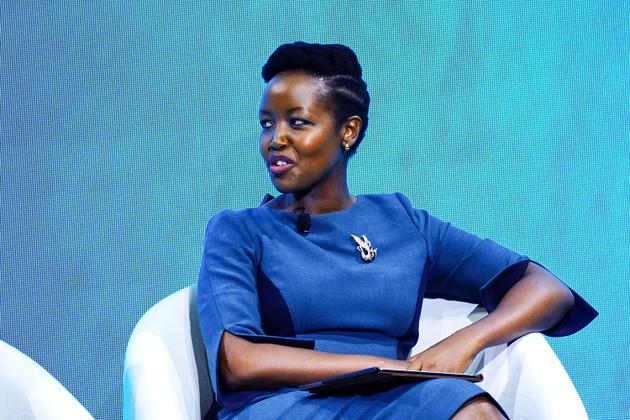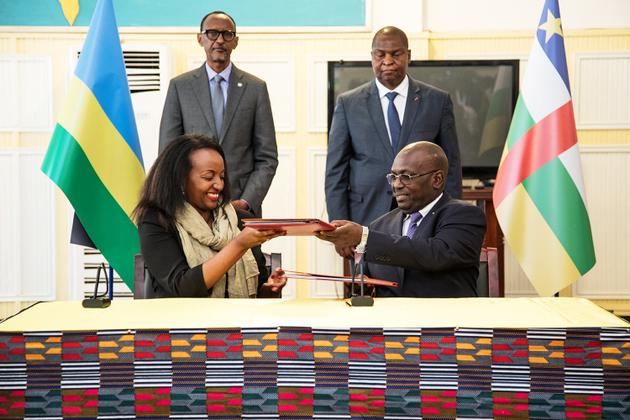

In Rwanda, women occupy high positions
NewsDespite the conservatism of Rwandan society, women are ministers, judges, bosses and more, while also constituting a majority in Parliament. This female prominence is set to continue after the July 15 elections, in which Paul Kagame will run for a fourth term.

A first-time visitor to the Rwandan Parliament cannot help but notice its bullet-riddled walls. Thirty years after the genocide perpetrated against the Tutsis in 1994, however, this testimony to a traumatic past is not the institution's most distinctive feature. That lies more in its composition, with 49 out of 80 seats being held by women (61.3%).
This world record will be challenged again in the presidential and parliamentary elections scheduled for Monday, July 15, in the "land of a thousand hills." Emma Rubagumya Furaha, a member of parliament, smiled knowingly when asked about the chances of this female prominence continuing. "Here, women believe in their chances, so they run in large numbers," said the 57-year-old MP, who chairs the political affairs and gender committee.
Back in 2003, the Rwandan Constitution introduced a 30% quota for women in all state decision-making bodies. Since then, this threshold has been regularly − and widely − exceeded in Parliament. While that might seem surprising, Furaha felt that it was only logical: "According to the statistics, we make up more than half of the Rwandan population. If we were left out, how could we seriously talk about development?" Today, she said, "the gender issue is taken into account in all the laws we consider: in terms of the family, of course, but also on the budget and invitations to tender."
Equality promoted after genocide
In some respects, the parliament has mainly functioned as a tool wielded by Paul Kagame, a leader whose sophisticated authoritarianism has caused both fascination and fear. In 2015, for example, the parliament members unanimously ratified a constitutional amendment allowing the Rwandan president to run for a fourth term, after he had already led the country for 24 years. Still, this assembly, presided over by a woman, Donatille Mukabalisa, has remained no less symbolic of the equality promoted in the aftermath of the genocide by the Rwandan Patriotic Front (RPF), the former liberation movement now in power. It was a decision partly dictated by historical necessity: "At the time, the majority of those who survived were women, so it was with them that Rwanda was rebuilt," said historian and sociologist Assumpta Mugiraneza. "In a pragmatic fashion, many were sent to school and university."
Today, these women have become ministers, judges and heads of major corporations. Most have earned a reputation for hard work and self-discipline, and some have risen through the ranks quickly. "There's no need for connections. All that counts is skills and the desire to serve one's country," said Paula Ingabire, minister of information and communications technology. A critical role in a country that has seen itself as an African hub for innovation, one that she inherited in 2018, at just 35 years of age.
A graduate of the prestigious Massachusetts Institute of Technology (MIT), where she studied on a government scholarship, Ingabire is now one of the most highly sought-after figures in the new Rwanda. Investors and donors have flocked to this elegant 40-something, capable of pitching her country's strengths in artificial intelligence, drones and other cutting-edge technologies in the space of a few minutes. Without a doubt, the application of female talent has contributed to the global brand image that tiny Rwanda, the darling of international donors, has managed to forge over the last decade.
'So much to do'
In its quest to increase the number of women in the workforce, the government has been using its networks in the administration to sift through the best candidates, including among the diaspora. "We clearly encourage highly qualified people to return home to work. There's so much to be done," said government spokeswoman Yolande Makolo, another powerful woman, candidly. She herself lived in Canada for 10 years, between 1993 and 2003, as did her sister, Yvonne Makolo, who today presides over the national airline, RwandAir. Like them, many of those in influential positions have been through exile, within families that fled the persecution of the Tutsis and the civil war that preceded the genocide.
Diane Karusisi, CEO of Bank of Kigali, the country's leading bank, was born in the Democratic Republic of Congo, then studied and worked in Switzerland. Tapped by the state, she returned to her homeland in 2009. "At first, it was just her. Now, six of the country's 11 banks are run by women," said Soraya Hakuziyaremye, deputy governor of the Central Bank of Rwanda.
She too began her career in finance abroad, in Belgium and then France, before joining the cabinet of a certain Louise Mushikiwabo in 2012. The latter, the current secretary general of the International Organization of La Francophonie, was then minister of foreign affairs. "With her career path, she was already a role model, for me and for many other women," said Hakuziyaremye, entrusted, alongside her, with the task of laying the foundations for a new economic diplomacy. In 2018, she herself became minister of trade in a government of equal representation, before joining the Central Bank.

The deputy governor was quick to congratulate herself on having been able to handle critical issues at an early stage. "It's a mark of confidence that we don't particularly find in Europe," she said, without deluding herself, though, about the work that has yet to be done in terms of equality. After all, the boardrooms and middle management of major companies have remained considerably male-dominated. Not to mention rural areas, where men are still the undisputed masters of the home. Hakuziyaremye has observed this through the lens of financial inclusion. "In the countryside, if a woman wants a loan, she is automatically asked if she has her husband's permission," said the banker, who has made this one of her priorities.
Confined to the fields and the home
"Rwanda remains a patriarchal and conservative society," said Juliette Karitanyi, by way of confirmation. From the terrace of a cozy bar in Kigali, this tireless women's rights activist, known on social media as "JujuLaBelle," described a reality that is difficult to discern from the capital's upscale districts. The legislative framework has guaranteed equal access to land, financial services and education.
Yet the vast majority of women have continued to be confined to the fields and the home. Gender-based violence remains high. And despite the persistent scourge of teenage pregnancy, in 2022 Parliament rejected a bill to allow access to contraception from the age of 15. "Social norms take time to change," said the feminist. "But we should also be pleased about how far we've come. There have been tremendous advances. And the fact that some women have reached the very top encourages all others to be ambitious."
In Rwanda, whatever rare criticism there is has generally been uttered with great restraint. It has been more common to express admiration for Kagame's leadership. "I don't know if there's anyone who's more of a feminist than he is" said Ingabire. "The emancipation of women is the fruit of his political efforts," said Furaha.
This dedication has often been combined with a certain sense of sacrifice. In a country obsessed with performance, staying at the highest level has required hard work. "As a woman, when you're promoted, you have to deliver twice as much," said Hakuziyaremye. "There aren't that many of us yet, and I'd be afraid that if I failed, I'd be closing the door on others behind me."
